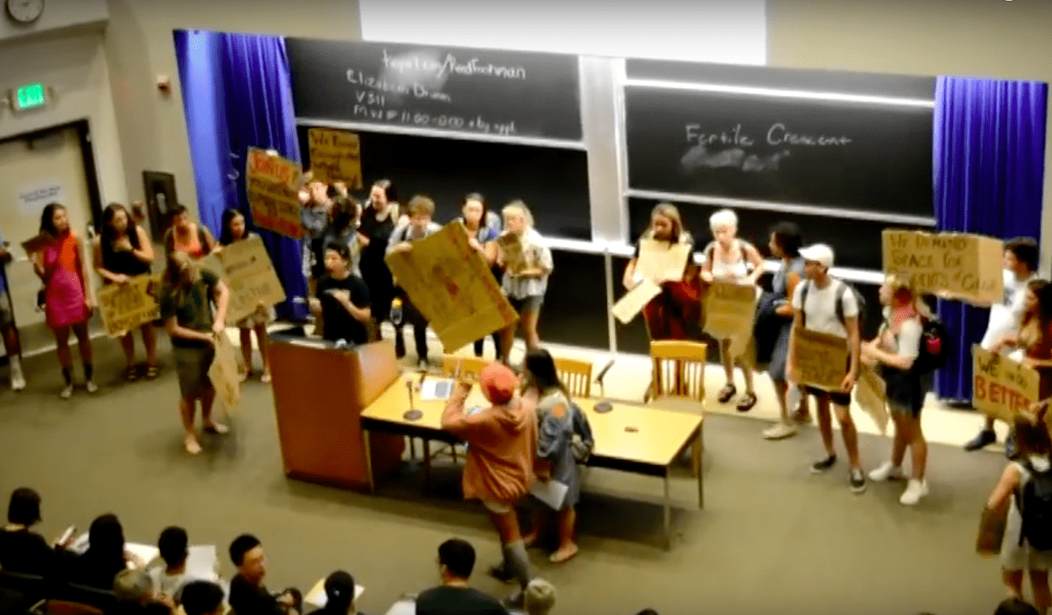Reed College in Portland, Ore., has a reputation for two things. One is academic excellence: it’s had far more than its share of Rhodes and Fulbright scholars, and has been called “the most intellectual college in the country.” The other is leftism and identity politics: its “Discover Reed Fly-in Program,” which pays the expenses of prospective students who want to visit the campus, is open to people of every background — except Caucasians.
The kids who get to go to Reed are part of a very fortunate minority. But like their counterparts two hours north at Evergreen State College in Olympia, Wash. – another college known both for its academics and its leftism – a good many of them are totalitarians in training. This summer, Evergreen made worldwide headlines because of the abusive treatment meted out by a gang of insufferable brats there to biology Prof. Bret Weinstein. Now the brats at Reed are kicking up a fuss of their own.
One of the things that make Reed academically special is Humanities 110, its required freshman lecture course in Western civilization. Taught by a team of experts on different authors and periods, and with a syllabus that includes Homer, Hesiod, Aeschylus, Sophocles, Euripides, Thucydides, Plato, Virgil, Ovid, the Book of the Dead, and parts of the Bible, it’s the kind of course that students at many another high-profile college shut down a couple of decades ago.
In 1987, Jesse Jackson led hundreds of Stanford students in the chant: “Hey hey, ho ho, Western civ has got to go.” Two years later, Stanford’s Western Culture course was replaced with a more “inclusive” program. But somehow the Western civ course at Reed survived.
That may change soon. In an article published last fall in the college magazine, Reed alumus Chris Lydgate recalled how much he’d loved the course when he took it three decades ago, but noted that students were now tagging it as “an example of institutional racism” that “conveys the surreptitious message that white men are the authentic source of thought and civilization.”
Claiming that the works taught in the course have played a role “in colonialism, racism, and slavery,” these students were demanding that the course be revised to “include a history of the Western canon as racist and anti-black.”
Lydgate discussed these complaints with several Hum 110 professors. One of them rejected the racism charge: “It presupposes that our contemporary racial categories are timeless.” Another reminded Lydgate that “Mediterranean civilization incubated the ideas and forms that gave rise to many of the foundational, positive and productive institutions of Western civilization, whose benefits we enjoy in the form of freedom of speech, the rule of law, and liberal democracy. … I think it is crucial for our students to have an accurate and critical knowledge of this civilizational legacy.”
Lydgate described last fall’s debate about Hum 110 as “spirited” but civil and respectful. During the succeeding months, however, as reported earlier this month in both Reason and The Economist, student agitators showed up for every single Hum 110 lecture and sat in the front of the auditorium, brandishing protest signs and “sometimes taping their mouths in protest at the absence of non-white voices in the syllabus.”
In November, at a Hum 110 lecture on Sappho, they called the lecturer, Lucia Martinez Valdivia, a “race traitor,” “anti-black,” and an “ableist,” eventually driving her to tears.
In December, an event unrelated to Hum 110 also brought out the crazies: Kimberly Pierce, director of the 1999 film Boys Don’t Cry, based on the real-life murder of a transsexual, was tormented mercilessly by young Jacobins who savaged her for not casting a transsexual in the lead role and for making a buck off of transsexuals’ misery.
These kids’ failure to grasp what a pathbreaking film Boys Don’t Cry was when it first came out – and how much it did to generate sympathy for transsexuals – provided a perfect example of just how little they have in the way of historical sense, and how important a course like Hum 110 really is. Studying literary works dating back two to four millennia can go a long way toward helping you to have the proper perspective on a movie made eighteen years ago.
In any event, as a result of student pressure, a committee was appointed to draw up a new Hum 110 curriculum. It was scheduled to be voted on this fall. Before that could occur, however, the haters leapt into action.
At the first Hum 110 lecture of the present semester, Professor Elizabeth Drumm, who runs Reed’s Western civ program, was standing at a lectern, and three of her colleagues were taking their seats at a table beside her, preparing to hold a panel discussion, when three female students took the stage. One of them – and this can all be viewed on YouTube – grabbed a mike. “We’re Reedies against Racism,” she said, “and – ”
Drumm responded immediately: “I’m sorry, this is a classroom space and this is not appropriate.”
The student retorted: “Well, we’ve worked just as hard on the syllabus as you all have – ”
Drumm repeated: “This is a classroom space.”
The student was not dissuaded. “Give us credit for our labor,” she said. “We’re Reedies against Racism and we’re protesting Hum 110 because of its Eurocentrism – ”
Drumm didn’t hesitate. Declaring that the class could not be held under such conditions, she canceled it and walked out. So did the panelists. The student with the mic seemed to be taken aback: she’d apparently expected Drumm and the panelists to wait patiently – as professors in similar circumstances have done at other colleges – and let her push her agenda.
In any event, the student kept talking: “This is an important part of your education about Hum 110. If you want to stay and learn about the events of the past year, whether or not you agree with us, we would appreciate if you would stick around – ”
One of her fellow Reedies against Racism added: “All we were going to say is that we are really against racism. … We believe that the first lesson that freshmen should know about Hum 110 is that it perpetuates white supremacy.” The three interlopers then introduced themselves, and as they did so, other members of their group joined them onstage and held up cardboard signs. One sign read: “Black Lives Matter at Reed.” Another: “We demand space for students of color.” And: “We Know Enough about White History.”
On the contrary, they don’t know anything about anything – and don’t want to. They’re not interested in acquiring an education. One wonders how many of them even understand the concept. Perhaps some of them understand it but are uneasy about it, because they realize how much a serious liberal education of the sort offered by Reed demands of them and they fear that they aren’t up to it.
One thing that has certainly become clear in recent months is that many of the loudest and most aggressive of these young rebels at places like Reed and Evergreen are simply not very bright.
And perhaps they know it. And perhaps that’s why they’ve embraced a simplistic worldview that dismisses all knowledge as subjective, that regards intelligence as a racist and sexist social construct, and that encourages them to measure their own personal value not by their individual efforts or academic accomplishments or I.Q. scores but by the number of victim groups they belong to and their success at tearing down the very altars, metaphorically speaking, at which they should be worshiping.
If Reed wishes to avoid the fate of the University of Missouri – where enrollment dropped precipitously in the wake of student protests – it should show these troublemakers the door immediately.








Join the conversation as a VIP Member